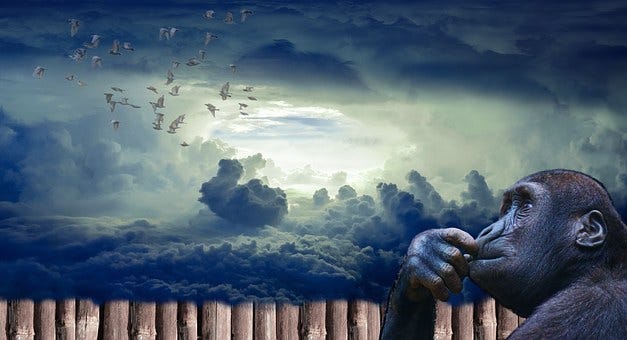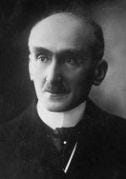
The purpose of this post is to discuss the term Intelligent Design in relation to evolutionary theory, and suggest that, even though it may have some merits, the term Creative Evolution may be better.
In a previous post, I noted that the emphasis can fall on either of the two words in Intelligent Design, its advocates stressing the ‘design’ element. However, it is also possible to stress the ‘intelligent’ element, thus putting ‘design’ onto the sidelines. This is more in accord with what can actually be observed, since there is strong evidence for intelligence in nature. The word design is therefore controversial, but the word intelligent less so, even Darwinian biologists agreeing that living organisms appear intelligent and purposeful, although they dismiss this as an illusion created by natural selection.
The perceived problem with the term Intelligent Design is that it suggests a specific being, an intelligent agent, planning in advance in the manner of an inventor or an artist, therefore that the organism is an after-effect, the result of this process. Atheists and materialists obviously want to reject this idea out of hand because of its supernatural implications.
Although advocates of Intelligent Design make scientific arguments, and usually avoid making specific claims about the nature of the designer, it is often the case that they are Christians. Therefore, hidden behind their arguments, there are assumptions about the truth of Christian theology, specifically monotheism and a personal God. Once these are assumed, there is little room for discussion about the nature of the designer, or the meaning of the term ‘design’, since there is only one candidate.
Thus Douglas Axe in his recent book, having made a scientific case for Intelligent Design, says: “the weighty realization that the great Cause of everything clearly reveals himself not as an impersonal force but as a very personal God… Creation is only ever accomplished by drawing upon what exists, and personhood, so fundamental to our existence, must therefore have come from someone in whom it already existed. Persons can only have come from a personal God”¹.
Likewise, Charles Colson and Nancy Pearcey, who challenge Darwinism from a conventional Christian standpoint, say: “The Christian worldview begins with the Creation, with a deliberate act by a personal Being who existed from all eternity”².
Therefore, in order to pursue that debate, it is important to consider how true this theology is, and what other possibilities there are. Is God personal? Is monotheism true? Most spiritual traditions believe that the ultimate ground of being is impersonal, therefore that any personal beings (gods, deities, high spiritual entities, or whatever you want to call them) are at a lower level in the hierarchy. We are therefore drawn into the debate between what is often called the God of the Bible and the God of the philosophers (a First Cause).
In the opinion of the Theosophical writer Edi Bilimoria, who in his book is seeking, as I do, a reunification of science and religion/spirituality, “there are four crucial misunderstandings (my italics) that must be cleared before there can be any hope of genuine and sustainable progress, on a large scale”. The first of these is “the notion of an external, anthropomorphic ‘Creator God’ (who performs according to his fancy), as preached by the exoteric religions… (his italics)”³. From this alternative spiritual perspective we would definitely have to find other non-Christian understandings of Intelligent Design.
Now let’s have a look at statements by two scientists critical of both Darwinism and Intelligent Design. The biologist Stephen Talbott says that “many of the opponents (Richard) Dawkins commonly has in mind prefer an intelligent designer. What seems to have fallen out of the argument on both sides is the organism itself, which has vanished into the automatisms of engineered machinery. Its living powers have been transferred to a mysterious designer, blind or otherwise, who, having messed around with everyone’s ancestors, remains conveniently obscure for current scientific investigation”⁴.
The physicist Amit Goswami has written Creative Evolution: a Physicist’s Resolution between Darwinism and Intelligent Design⁵. The jacket notes say: “Dr. Goswami’s central theme is that pure consciousness, not matter, is the primary force in the universe. This view differs radically from mainstream theories that see evolution as the result of simple physical reactions. It also differs from intelligent-design arguments that posit a clockmaker God who fabricated the universe. Biology, Dr. Goswami says, must come to terms with feeling, meaning, and the purposefulness of life. The key is the idea of creativity in biological development, which reconciles evolution with intelligent design by a purposive designer… What’s more, when the question of life’s purposefulness and the existence of the designer is reconciled with neo-Darwinism, other difficulties of biology are resolved” (my italics).
Two observations on the above are:
- the idea that pure consciousness is the primary force in the universe fits well with many spiritual traditions, although not necessarily with mainstream Christianity.
- the statement that “intelligent-design arguments… posit a clockmaker God who fabricated the universe”, may be an overstatement, since I don’t think that all ID advocates would argue that. It does, however, highlight the basic problem, that the word design stresses the importance of an earlier event, and perhaps does not attach enough importance to what is going on in the present.
The philosopher Henri Bergson has also written a book called Creative Evolution⁶. He notes that there is sometimes the “production of the same effect by two different accumulations of an enormous number of small causes”, that this “is contrary to the principles of mechanistic philosophy” (i.e. materialism), and that “every moment, right before our eyes, nature arrives at identical results, in sometimes neighbouring species, by entirely different embryogenic processes”. He then concludes: “We must appeal to some inner directing principle in order to account for this convergence of effects. Such convergence does not appear possible in the Darwinian, and especially the neo-Darwinian, theory of insensible accidental variations…” (my italics).
So we have a biologist, a physicist, and a philosopher making a similar argument. They are all saying that there is an ongoing process of creative evolution in organisms, and the two scientists are saying that the term Intelligent Design does not take this sufficiently into account. As I noted above and in previous articles⁷, atheistic neo-Darwinian biologists strongly agree that this appears to be the case, although they argue that this is an illusion created by the process of natural selection. (I suggest that it might be better to accept the evidence of their own eyes.)
The question is therefore, what spiritual or philosophical worldview is suggested by the phenomenon of creative evolution? Does it suggest animism? Some variety of pantheism? Does Christianity need to change its beliefs in order to accommodate this? Do we need some clarification of the concept of Intelligent Design in order for it to be reconciled with Creative Evolution? These are questions I will try to address in future posts.
Footnotes:
1. Undeniable, How Biology Confirms Our Intuition That Life is Designed, HarperOne, 2016, p254
2. Developing a Christian Worldview of Science and Evolution, Tyndale House Publishers, 2001, p24
3. The Snake and the Rope, the Theosophical Publishing House, 2006, p239
4. Can Darwinian Evolutionary Theory Be Taken Seriously? http://natureinstitute.org/txt/st/org/comm/ar/2016/teleology-30.htm This article is no longer available online, having been updated.
5. Quest Books, 2008
6. First edition 1911. The quote is from the 1954 edition, translated by Arthur Mitchell, Macmillan & Co Ltd., pp. 79–80.
7. See: The Problem of Natural Selection, and Intuition, Part 1
